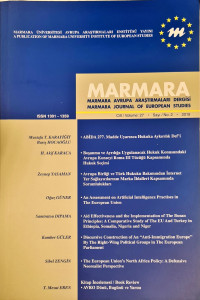Abstract
Bu çalışma, Avrupalı seçkinlerin, yani Avrupa Parlamentosu’ndaki (AP) sağ siyasi grup üyelerinin kamusal söylemi, dolayısıyla kamusal aklı kontrol altına almanın bir aracı olarak söylemleri nasıl kullandığını anlamayı ve ortaya çıkarmayı amaçlamaktadır. Söylemler, söz konusu siyasi grupların ideoloji, değer ve normlarının toplumda meşrulaştırılması amacıyla kullanılmaktadır. Bu durum, toplumsal gücün kötüye kullanılması, egemenlik veya eşitsizlik ile sonuçlanabilmektedir. Çalışma, esas olarak, bu siyasi grupların AP görüşmeleri sırasında üç ana söylem konusu çerçevesinde söylemsel olarak göç karşıtı Avrupa inşa ettiğini savunmaktadır: güvenlik tehdidi, ekonomik tehdit ve kültürel tehdit olarak göç. Bu çalışma, savlarını temellendirmek amacıyla, göçün güvenlikleştirilmesi bağlamında Kopenhag Okulu’nun yanı sıra Norman Fairclough ve Ruth Wodak’a yapılan bazı atıflar ile birlikte, çoğunlukla Teun A. van Dijk’ın eleştirel söylem çözümlemesi toplum-bilişsel yaklaşımı sayıltılarına ve stratejilerine dayanmaktadır. Sağ siyasi grup üyelerinin Öteki’ne, yani sığınmacı, mülteci ya da göçmenlere olumsuz imalar, önvarsayımlar, adlandırma veya yüklemleme ile atıfta bulunurken Öz’ü, yani Avrupa’yı ve bazen kendi ülkelerini çeşitli olumlu atıflarla yücelttiği görülmektedir. Bu durum, göç karşıtı siyasetçilerin yaygın bir tutumudur ve göç karşıtı Avrupa inşasına zemin hazırlamaktadır. Son ama oldukça önemli olarak, ‘mülteci krizi’ varsa, o halde, diyalektik olarak zıttı da mümkündür: ‘mülteci farkındalığı’. Bu çalışma, aynı zamanda, ‘mülteci farkındalığı’ oluşumuna katkıda bulunmayı amaçlamaktadır.
Keywords
Göç karşıtı Avrupa Avrupa Parlamentosu’ndaki sağ siyasi gruplar göçün güvenlikleştirilmesi eleştirel söylem çözümlemesi mülteci farkındalığı
References
- Aker, T. (2017) “Hate speech, populism, and fake news on social media – towards an EU response (Debate)”, 5 April, <http://www.europarl. europa.eu/sides/getDoc.do?type=CRE&reference=20170405&secondRef=ITEM-013&language=EN>, (7 May 2018).
DISCURSIVE CONSTRUCTION OF AN “ANTI-IMMIGRATION EUROPE” BY THE RIGHT-WING POLITICAL GROUPS IN THE EUROPEAN PARLIAMENT
Abstract
This study is aimed at understanding and exposing how the European elites, i.e. the members of the right-wing political groups in the EP, use discourses as a means of controlling public discourse, and hence, the public mind. Discourses are used to legitimate the ideology, values and norms of the relevant political groups in the society, which may result in social power abuse, dominance or inequality. The study mainly argues that these political groups discursively construct an anti-immigration Europe during the EP debates within three main discourse topics: immigration as a security threat, as an economic threat and as a cultural threat. Along with some references to Norman Fairclough and Ruth Wodak as well as the Copenhagen School in terms of the securitisation of migration, this study mostly draws on the premises and strategies of Teun A. van Dijk’s socio-cognitive approach of critical discourse analysis to base its arguments. It is seen that the members of the right-wing political groups tend to glorify the Self, i.e. Europe and sometimes their own country, with various positive attributions to them whereas they mostly refer to the Other, i.e. asylum seekers, refugees or migrants, through negative implications, presuppositions, denomination or predication, which is a common attitude of anti-immigration politicians and paves the way for the construction of an anti-immigration Europe. Last but not least, if there is a “refugee crisis”, then, dialectically, the opposite is also possible: “refugee awareness”. This study also aspires to contribute to the formation of “refugee awareness”.
Keywords
Anti-immigration Europe right-wing political groups in the European Parliament securitisation of migration critical discourse analysis refugee awareness
References
- Aker, T. (2017) “Hate speech, populism, and fake news on social media – towards an EU response (Debate)”, 5 April, <http://www.europarl. europa.eu/sides/getDoc.do?type=CRE&reference=20170405&secondRef=ITEM-013&language=EN>, (7 May 2018).
Details
| Primary Language | English |
|---|---|
| Journal Section | Makaleler |
| Authors | |
| Publication Date | December 31, 2019 |
| Published in Issue | Year 2019 Volume: 27 Issue: 2 |


